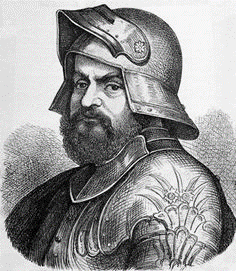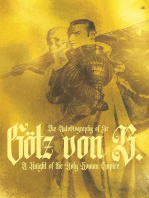Götz von Berlichingen - The Autobiography of Sir Götz von Berlichingen
Here you can read online Götz von Berlichingen - The Autobiography of Sir Götz von Berlichingen full text of the book (entire story) in english for free. Download pdf and epub, get meaning, cover and reviews about this ebook. genre: Art. Description of the work, (preface) as well as reviews are available. Best literature library LitArk.com created for fans of good reading and offers a wide selection of genres:
Romance novel
Science fiction
Adventure
Detective
Science
History
Home and family
Prose
Art
Politics
Computer
Non-fiction
Religion
Business
Children
Humor
Choose a favorite category and find really read worthwhile books. Enjoy immersion in the world of imagination, feel the emotions of the characters or learn something new for yourself, make an fascinating discovery.
- Book:The Autobiography of Sir Götz von Berlichingen
- Author:
- Genre:
- Rating:5 / 5
- Favourites:Add to favourites
- Your mark:
- 100
- 1
- 2
- 3
- 4
- 5
The Autobiography of Sir Götz von Berlichingen: summary, description and annotation
We offer to read an annotation, description, summary or preface (depends on what the author of the book "The Autobiography of Sir Götz von Berlichingen" wrote himself). If you haven't found the necessary information about the book — write in the comments, we will try to find it.
The Autobiography of Sir Götz von Berlichingen — read online for free the complete book (whole text) full work
Below is the text of the book, divided by pages. System saving the place of the last page read, allows you to conveniently read the book "The Autobiography of Sir Götz von Berlichingen" online for free, without having to search again every time where you left off. Put a bookmark, and you can go to the page where you finished reading at any time.
Font size:
Interval:
Bookmark:

The Autobiography of Sir Gtz von Berlichingen:
A Knight of the Holy Roman Empire
J U L I U S M O R I T Z

A N T E L O P E ii H I L L ii P U B L I S H I N G
Translation Copyright 2022 Antelope Hill Publishing
First printing 2022.
Original manuscript (Rossacher Handschrift) from 1567 was edited and published as Ritterliche Thaten Gtz von Berlichingen's mit der eisernen Hand by Verlag: Pforzheim Finck, 1843, and translated from German by Julius Moritz, 2021.
Cover art by Swifty.
Edited by Rollo of Gaunt.
Interior formatting by Margaret Bauer.
Antelope Hill Publishing
www.antelopehillpublishing.com
Paperback ISBN-13: 978-1-953730-25-1
EPUB ISBN-13: 978-1-953730-26-8

Gottfried Gtz von Berlichingen was born in 1480 in Jagsthausen, in the South German region of Swabia, in the Holy Roman Empire. He died on July 23rd, 1562, in his castle in Hornberg. He was buried in the Schntal Monastery. He was married twice, first with Dorothea von Sachsenheim and from 1517 onwards with Dorothea Gailing von Illesheim. He had three daughters and seven sons, five of which died in their early childhood.
Gottfried Gtz von Berlichingen (14801562) is not quite a household name, but still one that has left its mark on history. The famous (or infamous, depending on who you ask) knight was first enshrined as a German folk hero by Johann Wolfgang von Goethes eponymous 1773 drama. He belonged to a class of smallholding Imperial Knights from Swabia in South Germany, a notoriously fragmented and rambunctious region in those days. Swabia in the old days of the Holy Roman Empire had been a center of Imperial power, and a rival of the other powerful stem duchies of Franconia and Saxony. The powerful Hohenstaufen family ruled it for a time, and also ruled as Holy Roman Emperors, Kings of Sicily, and (at least nominally) as Kings of Jerusalem. The downfall of the Hohenstaufen dynasty produced chaos throughout the Empire, but especially in Swabia.
Near-constant political intrigue and petty warfare, combined with the regions close involvement in Imperial affairs, allowed Gtz along with many of his peers to achieve high renown within the Empire. Some of these peers included the father of the Imperial Landsknechts, Georg von Frundsberg, and the rebellious knight Florian Geyer von Giebelstadt. All three would later give their names to Divisions of the Waffen-SS during the Second World War (respectively, the 8th Florian Geyer, 10th Frundsberg, and 17th Gtz von Berlichingen), underlining their high status in German folk history.
The story of Gtz von Berlichingens life is a fascinating one, and his first-person retelling of his adventures includes many humorous elements alongside the more serious and matter-of-fact. This edition has been translated from the original text of Gtz manuscript, the Rossacher Handschrift, written in the rough dialect of his native Swabia. As is the norm with our translations, readability has been prioritized, but some of the roughness of Gtz dialect has been left as-is to faithfully convey the character of the original. Some of the translations are imperfect or took a certain amount of guesswork, which the kind reader must forgive due to the wildly divergent spellings and abbreviations used in the original.
Footnotes have been added liberally to clarify idioms, geography, dates, and other terminology that Gtz, writing for a contemporary German audience, took for granted. Some of this terminology, especially the political nomenclature, may be confusing to a reader unschooled in the intricacies of the German (Holy Roman) Imperial system of feudal government. Authority was often tied up in a complicated web of familial ties, regional networks, oaths, contracts, alliances, personal feuds, Church authority, and intermediate hierarchies, all interacting with each other. Arguably the most important element of rank was Imperial Immediacy, a term that describes a landholding noble lord subject only to the emperor himself, and who at times enjoyed quasi-sovereign status. Such nobles are often referred to as Princes or Frsten regardless of their actual rank, and had certain rights not held by nobles who were subject to other liege-lords. The most powerful among these were the Kurfrsten, or Electors, seven in total, who held the privilege of electing the next heir to the Imperial throne. As this book is intended to be a story of Gtz life and not a history textbook, however, I have tried to give explanations that are as detailed as possible without inordinately expanding the already sizeable number of notes.
I have also maintained German titles in most places (Kaiser for Emperor, Herzog for Duke, Graf for Count, etc.) while providing translations and explanations in the notes. English place names are used where appropriate (Saxony, Bavaria, etc.), with German place names where no English equivalent is in common use. I have further maintained the German von when part of a name, but use the English of when referencing a rulers title (Gtz von Berlichingen, Herzog Friedrich of Saxony). These choices are stylistic in nature and may not be perfectly consistent in all cases.
One might wonder why this particular book has been selected for an English translation at the cost of countless hours of labor. Gtz offers us no particular political ideology, certainly not any which would be especially relevant today. In many ways he is not a particularly moral man either: even in his own words he often appears vain, willing to bend the truth to suit his own image, prone to petty violence over minor slights, and quick to commit robbery and ransom for no particularly good cause. One would have good cause to question the veracity of many of his statements.
My answer to this is a simple one: Gtz is not a paragon, but he is a great man. He is fiercely loyal to his friends and kinsmen, giving his service freely and always being the first to volunteer, gracious in accepting the aid they give to him in return. His attitude towards death and danger is cavalier, leading him to dare where other men would not. He earns respect even from his enemies, while those who fail to respect him often learn the hard way. He lived for eighty-two long years, itself no small feat, and fought as a mercenary knight well into his later years. Even the loss of his arm could not stop him. Instead of retiring or drowning himself in misery, he had an iron prosthetic fitted to the stump of his right hand and carried on his feuding, earning the nickname Iron Hand Gtz (and providing the inspiration for the character Guts, the Black Swordsman, from the series Berserk). His famous quip, he can lick my ass, immortalized by Goethe and Mozart, sums up his blas pugnacity rather well. It is only much later in his life, as an old and probably quite exhausted man, that he has any cause for regrets or shame.
Gtz von Berlichingen was, simply, a man filled with an abounding love of life, an unquenchable desire to throw himself into the world without reservation. He was not restrained by an overbearing civility or even by the law, but wanted above all to win fame, honor, and respect from those around him, and do right by those who had done right by him. He was truly one of the last knights of romance. In a time where most souls are shriveled and dusty from disuse, such a figure shines all the brighter.
Next pageFont size:
Interval:
Bookmark:
Similar books «The Autobiography of Sir Götz von Berlichingen»
Look at similar books to The Autobiography of Sir Götz von Berlichingen. We have selected literature similar in name and meaning in the hope of providing readers with more options to find new, interesting, not yet read works.
Discussion, reviews of the book The Autobiography of Sir Götz von Berlichingen and just readers' own opinions. Leave your comments, write what you think about the work, its meaning or the main characters. Specify what exactly you liked and what you didn't like, and why you think so.








